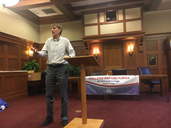
I had the opportunity to learn directly how legislation is made when a former student of mine contacted me in 1983 about taking a leave from my position at the University of Michigan-Dearborn to become the economist for the Michigan Senate Republicans. Of course, I had heard the old quote from Otto von Bismarck, “If you like laws and sausages, you should never watch either one being made,” and as I was teaching Public Choice (which I teach here now), a course using economic theory to examine the political process, I was intrigued.
John Engler was the minority leader in the Senate and was forming a policy team that would be made up of experts in different fields rather than by political operatives. I went to Lansing and interviewed with Sen. Engler and was impressed with the idea that legislation would be put forth and analyzed by people who were able to examine the unintended consequences of legislation as well as the intended ones. For my Economics 105 students, it was a chance to follow the advice of Bastiat and Mises and examine the seen and the unforeseen.
So, starting in February on the days I was not teaching, and beginning full-time once school was over, I became the economist for the Senate Republican Policy staff. This entailed providing analysis for the senators of bills, and eventually I was relied upon to draft legislation. My main job was to work with the Senate Finance Committee and advise the senators on legislation before the committee.
At the time the Democrats controlled the House, Senate, and governorship, so we did not have much influence on what bills actually passed. But less than a year after I arrived, there was a recall election in which two Democratic senators were recalled and replaced by Republicans. This meant Republicans became the majority and took over chairmanship of all the committees as well as making up the majority of all committees. Until going to Lansing, I was not aware of the fact that if a party gains a majority in the House or Senate, it controls all the legislation.
For the next nearly six years I was able to use my expertise in the courses I had been teaching, public finance and public choice, and, in particular the Austrian school analysis of how markets work, to advise both the Republicans and the Democrats on legislation. Sen. Engler was an excellent leader in that he had a philosophy of limited government and an understanding of how markets work, and surrounded himself with advisors with similar philosophy and relied upon their expertise to form policy.
Sen. (later Governor) Engler separated the policy staff from the political staff. This created a separation between those who were in Lansing to ensure that the senators got reelected and those who were forming a policy consistent with a philosophy of limited government and reliance on markets. Generally these things were not in conflict, but occasionally they were.
One of these times that has stuck with me for decades was when a bill was before the legislature that would have benefited one group that generally supported Republicans over another group. I found that the bill would put government into a position of what Bastiat would have called legalized plunder (for my Economics 105 students) and argued against the legislation in a closed door caucus of the senators. One of the senators pointed out that we would be going against a group that generally supported Republicans and that there was a special election coming up. Sen. Dick Posthumous (later to become Lieutenant Governor) stood up and said the senators should vote the way that was best for Michigan and he would personally raise the money if needed to make up for any loss of contributions from the special interest group. That experience was gratifying in that it showed that legislation would not be dominated by whoever did the most to elect the senators.
I found that advising on policy and testifying to committees was a lot like teaching a class. If you made the argument clear enough that the senators would be comfortable explaining it to their constituents, then your position would prevail. I make this point to my students. One day they may be an elected representative themselves, or staff to elected officials, and will be able to affect policy if they are clear in their explanations.
All in all, my time in the Senate was interesting, exciting, and fun. It lead to my taking a leave of absence from Hillsdale to become Deputy State Treasurer under Governor Engler, doing much the same thing as I was doing, only this time from the executive branch. It was made up of winning the battle of ideas as Mises might say. In fact, I brought up Mises frequently enough in testimony that the chief of staff to Governor Engler used to quote me as saying “I love Mises to pieces.”
The editors invite faculty members to contribute to Office Hours, a weekly column dedicated to promoting relationships between staff and students through the giving of advice and stories. Send submissions to the Opinions Editor at kmcghee@hillsdale.edu.

